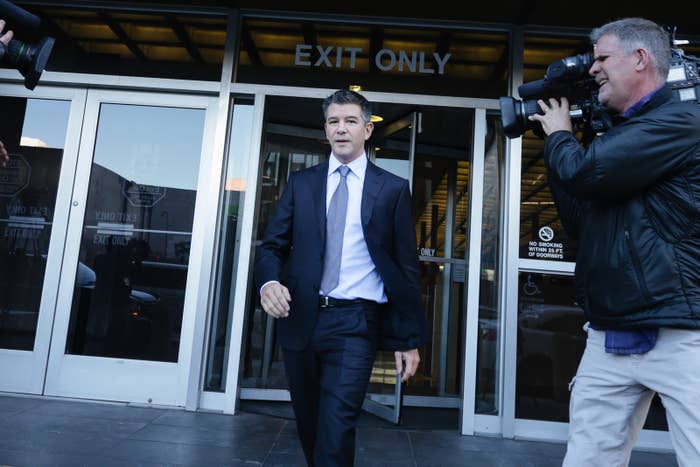
Waymo, the self-driving car unit of Google's parent company Alphabet, unexpectedly settled its trade secrets lawsuit Friday, ending a nearly yearlong legal battle between two of Silicon Valley's biggest companies.
The surprise settlement, in which Waymo obtained 0.34% of Uber's equity, valued at $245 million at a $72 billion valuation, comes four days after the start of the trial in the case. This week Waymo called former Uber CEO Travis Kalanick and board member Bill Gurley to the stand in a San Francisco federal court for questioning.
“We are committed to working with Uber to make sure that each company develops its own technology," a Waymo spokesperson said in a statement. "This includes an agreement to ensure that any Waymo confidential information is not being incorporated in Uber Advanced Technologies Group hardware and software. We have always believed competition should be fueled by innovation in the labs and on the roads and we look forward to bringing fully self-driving cars to the world.”
The settlement, which is notably less than the billion-dollar figures that were being discussed when the lawsuit was first filed more than 11 months ago, ends what could have been years of costly litigation between both sides.
Both companies had discussed the possibility of appealing the settlement had it not gone their way, while there was also discussion of Waymo bringing another lawsuit for the theft of trade secrets regarding self-driving car software. This suit only pertained to self-driving car hardware, particularly the design of Lidar technology, which allows an autonomous vehicle to sense its surroundings in real time.
In his note to employees, new Uber CEO Dara Khosrowshahi struck an apologetic tone and addressed the "mistakes of the past" made under Kalanick's leadership. Kalanick resigned in June after months of turmoil within the company stemming from allegations of widespread sexual harassment, discrimination, and questionable behavior at the executive level.
"The acquisition of Otto made good business sense," Khosrowshahi wrote, referring to the self-driving truck startup founded by former Google engineer and autonomous vehicle pioneer Anthony Levandowski. "But the prospect that a couple of Waymo employees may have inappropriately solicited others to join Otto, and that they may have potentially left with Google files in their possession, in retrospect, raised some hard questions."
Kalanick said in a statement, "No trade secrets ever came to Uber. Our sole objective was to hire the most talented scientists and engineers to help lead the company and our cities to a driverless future ... I remain proud of the critically important contributions Uber ATG [Advanced Technologies Group] has made to the company's future, and I look forward to their inspired efforts becoming a reality on the roads in cities around the world."
Khosrowshahi, in his letter, was adamant that no trade secrets from Waymo made their way into Uber's self-driving car project and noted that "we are taking steps with Waymo to ensure our Lidar and software represents just our good work." He also called the people at Alphabet Uber's "friends" and "competitors" who "share a deep belief in the power of technology to change people's lives for the better."
Friday's settlement, in which both sides agreed to pay their own legal fees, is surprising given how far the lawsuit went.
Waymo sued Uber almost a year ago on Feb. 23, alleging that a vast amount of technology was taken after Uber acquired Otto. That acquisition, which happened in August 2016, was expected to cost Uber $680 million.
Extremely cynical take: this means Uber gets to hold back a ton of the stock comp that Otto employees were promised… https://t.co/9OdVC2aoCq
Waymo cried foul on the deal, noting that Uber only bought the company months after its founding and discovered that engineer Levandowski had taken company files with him upon his departure in January 2016. That fact, and a host of others, were used to bolster Waymo's case against Uber, leading to months of depositions — in which Levandowski pleaded the Fifth — and culminated in this week's trial.
For Waymo, the settlement amount is a small takeaway in a much larger picture. Having worked on self-driving vehicles since 2009, the company was able to show that it is willing defend its lead in the space at great personal cost and was able to get a concession from Uber on software, which was not part of this lawsuit (no details were immediately available).
For Uber, the settlement removes one of the last remnants of Kalanick's legacy and allows Khosrowshahi to move forward by apologizing, something he's done with everyone from transportation regulators in London to the 1 percent at Davos. By mentioning that Uber and Waymo are "partners" in his letter, he also seemed to leave the door open to future partnerships, however unlikely that may seem after a bitter year.
It's also unclear what this means for Lyft, Uber's biggest competitor in the US market, which took a $1 billion investment led by Alphabet last October. Alphabet, which previously invested in Uber in 2013, now owns significant chunks of both companies, whose cutthroat rivalry has been well documented over the past few years.
A Lyft spokesperson did not immediately respond to a request for comment.
UPDATE
This post has been updated with a statement from Travis Kalanick.
